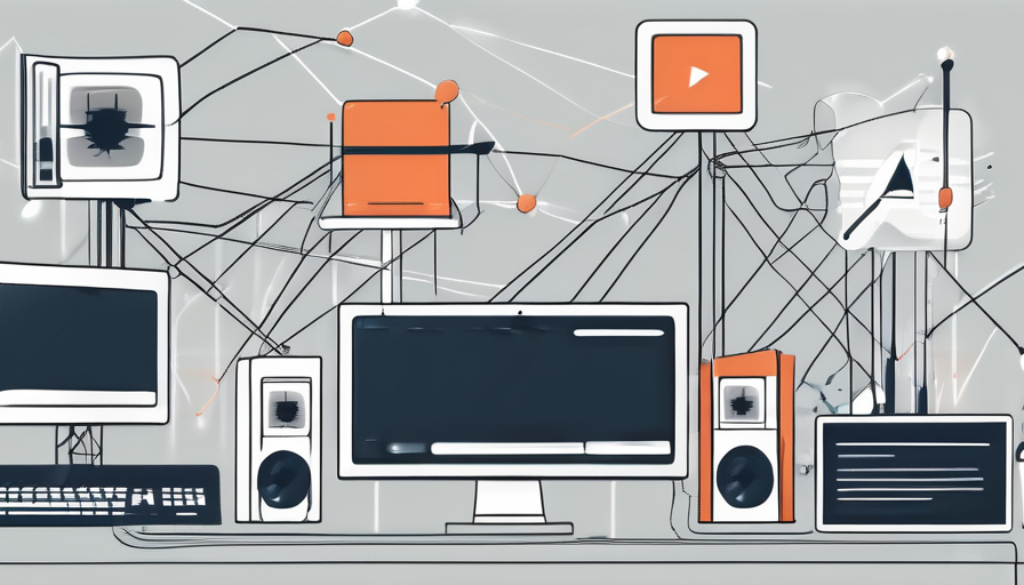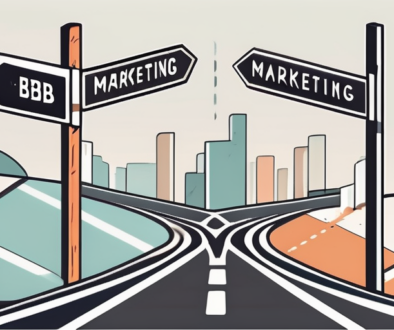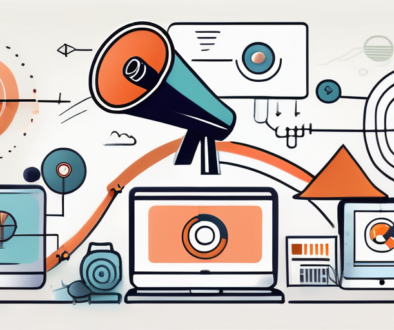The Best B2B Marketing Channels for Success
In today’s digital age, having an effective marketing strategy is crucial for the success of any business, especially in the B2B (Business-to-Business) context. With so many marketing channels available, it can be overwhelming to determine which ones will yield the best results. In this article, we will explore the best B2B marketing channels that can drive success for your business.
Understanding B2B Marketing Channels
Before diving into the different marketing channels, it is important to understand the significance of B2B marketing channels. B2B marketing channels refer to the various platforms and avenues through which businesses reach their target audience to promote their products or services.
One key aspect to consider when delving into B2B marketing channels is the diversity of options available to businesses. These channels can range from traditional methods such as trade shows and direct mail to modern digital platforms like social media, email marketing, and search engine optimization (SEO). Each channel offers unique opportunities for businesses to connect with their audience and drive engagement.
The Importance of B2B Marketing Channels
Effective B2B marketing channels are essential for businesses to generate brand awareness, attract potential clients, and ultimately drive revenue. By leveraging the right channels, businesses can establish a strong online presence and build relationships with their target audience, leading to increased sales and customer loyalty.
Furthermore, B2B marketing channels play a crucial role in establishing credibility and trust with potential clients. Consistent and strategic communication through various channels helps businesses showcase their expertise and industry knowledge, positioning them as reliable partners in the eyes of their target audience.
The Difference Between B2B and B2C Marketing Channels
While some marketing channels work well for both B2B and B2C (Business-to-Consumer) marketing, it is crucial to understand the differences between the two. B2B marketing often involves longer sales cycles, higher average deal sizes, and a more targeted audience. Therefore, B2B marketing channels need to focus on building relationships, providing valuable content, and targeting specific decision-makers within organizations.
Moreover, B2B marketing channels require a more personalized approach compared to B2C channels. Tailoring content and messaging to address the specific needs and pain points of businesses is essential for driving engagement and conversions in the B2B space. This targeted approach ensures that businesses can effectively communicate their value proposition and differentiate themselves from competitors in a crowded marketplace.
Exploring Various B2B Marketing Channels
Now that we understand the importance of B2B marketing channels, let’s delve into some of the most effective ones:
Social Media Platforms for B2B Marketing
Social media platforms like LinkedIn, Twitter, and Facebook offer great opportunities for businesses to connect with potential clients. These platforms allow businesses to share valuable content, engage in industry discussions, and showcase their expertise. Additionally, LinkedIn, being a professional networking platform, is especially valuable for B2B companies to build and strengthen relationships.
For instance, on LinkedIn, businesses can join relevant industry groups and participate in discussions, providing insights and establishing themselves as industry experts. By actively engaging with potential clients, businesses can build trust and credibility, ultimately leading to more conversions and long-term partnerships.
Email Marketing in B2B Context
Email marketing remains a powerful tool in the B2B marketing arsenal. By building an email list of potential clients, businesses can regularly communicate with them, share relevant updates, and nurture leads. Personalized, targeted email campaigns can significantly increase engagement and conversion rates.
When crafting email campaigns, it’s essential to focus on providing value to the recipients. Businesses can share industry insights, case studies, and success stories that resonate with their target audience. By delivering valuable content directly to their inbox, businesses can establish themselves as trusted advisors and increase the likelihood of converting leads into customers.
Content Marketing and SEO for B2B
Content marketing, combined with search engine optimization (SEO), is a winning strategy for B2B businesses. By creating informative and valuable content, businesses can establish themselves as thought leaders in their industry. Optimizing content for search engines helps increase visibility and organic traffic to their website, driving potential clients to explore their offerings.
When developing content, businesses should focus on addressing their target audience’s pain points and providing solutions. By conducting thorough keyword research and incorporating relevant keywords into their content, businesses can improve their search engine rankings and attract qualified leads. Additionally, businesses can leverage different content formats such as blog posts, whitepapers, and videos to cater to different preferences and engage a wider audience.
Webinars and Virtual Events as B2B Channels
In today’s digital era, webinars and virtual events have gained immense popularity in the B2B space. These platforms allow businesses to showcase their expertise, engage with their audience in real-time, and generate leads. Webinars and virtual events provide an interactive and personalized experience for potential clients, making them effective B2B marketing channels.
During webinars, businesses can deliver in-depth presentations, host panel discussions with industry experts, and conduct live Q&A sessions. This level of interactivity allows businesses to establish a strong connection with their audience and address their specific needs and concerns. By providing valuable insights and actionable takeaways, businesses can position themselves as trusted advisors and nurture leads through the sales funnel.
Furthermore, virtual events offer businesses the opportunity to connect with a broader audience from different geographical locations. By hosting virtual conferences or trade shows, businesses can reach potential clients who may not have been able to attend physical events. This expanded reach can lead to increased brand awareness, networking opportunities, and ultimately, business growth.
Optimizing Your B2B Marketing Strategy
Now that we have explored the various B2B marketing channels, it is essential to optimize your strategy to maximize success.
When it comes to optimizing your B2B marketing strategy, one crucial aspect to consider is the content you are delivering through your chosen channels. High-quality, relevant content is key to engaging your target audience and driving conversions. Whether it’s informative blog posts, engaging videos, or interactive webinars, ensuring that your content is tailored to meet the needs and interests of your audience is paramount.
Choosing the Right Channels for Your Business
Not all marketing channels will be equally effective for every business. It is crucial to identify the channels that align with your target audience and industry. Conduct market research, analyze competitors, and experiment with different channels to determine which ones yield the best results for your business.
In addition to selecting the right channels, it’s also important to consider the timing of your marketing efforts. Understanding the buying cycles of your target audience can help you deliver the right message at the right time, increasing the likelihood of conversion. By aligning your marketing activities with key industry events or seasonal trends, you can capitalize on opportunities to reach potential customers when they are most receptive.
Measuring Success in B2B Marketing Channels
To ensure the effectiveness of your chosen channels, it is important to set measurable goals and track key performance indicators (KPIs). Analyze data, such as website traffic, conversions, and engagement metrics, to determine the success of your marketing efforts. This data-driven approach will help you make informed decisions about channel optimization.
Furthermore, leveraging marketing automation tools can streamline the process of tracking and analyzing data, allowing you to gain valuable insights into the performance of your campaigns. By utilizing automation for tasks such as lead scoring, email marketing, and campaign tracking, you can optimize your marketing strategy more efficiently and effectively.
Adapting Your Strategy Based on Performance
Marketing is an ongoing process, and it is crucial to continuously monitor and adapt your strategy based on channel performance and market dynamics. Regularly review data, gather feedback from customers, and stay updated with industry trends to refine and optimize your B2B marketing strategy for long-term success.
Moreover, fostering strong relationships with your customers and prospects can also play a significant role in the success of your B2B marketing efforts. By engaging with your audience through personalized communication, providing exceptional customer service, and seeking feedback to improve your offerings, you can build trust and loyalty that leads to long-term partnerships and business growth.
Future Trends in B2B Marketing Channels
As technology continues to evolve, new trends emerge in B2B marketing channels. Here are some future trends to keep an eye on:
The Rise of AI in B2B Marketing
Artificial Intelligence (AI) is transforming the B2B landscape, enabling businesses to automate processes, personalize marketing campaigns, and gain valuable insights from data. AI-powered chatbots, predictive analytics, and customer segmentation are just a few examples of how AI is revolutionizing B2B marketing channels.
Imagine a world where AI-powered chatbots can engage with potential customers, answering their questions and providing personalized recommendations. These chatbots can analyze customer data in real-time, allowing businesses to offer tailored solutions and experiences. With AI, businesses can automate repetitive tasks, freeing up valuable time and resources to focus on strategic initiatives.
The Role of Big Data in B2B Marketing
Big data plays a crucial role in B2B marketing, providing businesses with invaluable insights into customer behavior, preferences, and market trends. By harnessing the power of big data, businesses can enhance their targeting capabilities, optimize marketing campaigns, and make data-driven decisions to drive success.
Imagine a scenario where businesses can analyze massive amounts of data to identify patterns and trends. This allows them to understand their customers better and tailor their marketing efforts accordingly. By leveraging big data, businesses can gain a competitive edge by identifying new market opportunities, predicting customer needs, and delivering personalized experiences.
The Impact of Mobile Marketing in B2B
With the increasing prevalence of smartphones and tablets, mobile marketing is becoming a dominant force in B2B marketing. Businesses need to optimize their websites for mobile devices, leverage mobile apps, and utilize SMS marketing to reach their target audience effectively.
Picture a world where businesses can connect with their B2B customers through mobile apps, providing them with instant access to product information, pricing, and support. With mobile marketing, businesses can leverage location-based targeting, push notifications, and SMS marketing to engage with their audience in real-time. This allows for more personalized and timely interactions, ultimately driving customer loyalty and satisfaction.
In conclusion, choosing the right B2B marketing channels is vital for business success. By understanding the importance of these channels, exploring various options, optimizing your strategy, and staying informed about future trends, your business can leverage the power of B2B marketing channels to drive growth, generate leads, and ultimately achieve success in the competitive business landscape.



